State-Builders
Szöveg: Béla Szabó | 2011. január 26. 17:42International public opinion is still extremely divided over the independence of Kosovo. The new state has numerous unresolved issues within its borders, so the multinational NATO Kosovo Force (KFOR) –including a Hungarian contingent – is deployed in Kosovo to bring peace into the daily lives of the population.
The independent state of Kosovo has been recognized by 61 countries, among them every relevant western power and every neighbor but Serbia. Most actors who refuse to recognize it – with the exception of Russia – either do not have a stake in the Kosovo issue or see the declaration of independence as an ominous precedent.
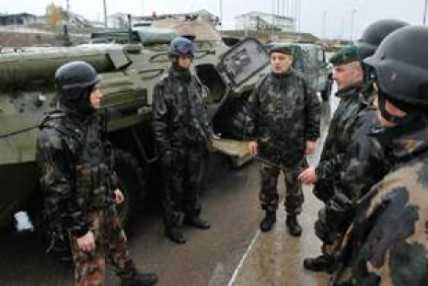
Despite all the above, the main issue in present-day Kosovo is whether the state-building process launched under international auspices can, in the foreseeable future, lead to a political system that is capable of functioning independently and complies with certain basic democratic and minority protection norms – as well as an economic system free of crime. Many are skeptical since the period from the declaration of independence to the present day shows a mixed picture. As regards the institutional aspects of state-building (constitutional legislation, jurisdiction, development of public administration), so far the independent Kosovo has generally produced satisfactory results , but progress remains slow in the fields of curbing corruption and the protection of minorities, while the economy is still “on life support" provided by external aid. The widening chasm between the Albanian and the Serbian communities presents a very serious problem. Northern Mitrovica and its environs are practically living a separate life, being integrated into the economic, infrastructural, and political system of Serbia without any links with the institutional system of Kosovo. Clashes between Serbs and Albanians break out on an almost daily basis, and the fact that so far the authorities have managed to avoid any flare-up of serious violence may be considered a positive result.
Corruption is rife in the country. State officials and the members of law enforcement organs are often among the profiteers who capitalize on the privatization of state assets, accepting bribes and being involved in the trafficking of humans or in arms, cigarettes, fuel or drugs smuggling.
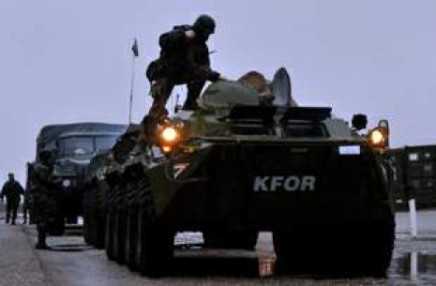
Having been established on the basis of UN Security Council Resolution No. 1244, the NATO Kosovo Force (KFOR) deployed in the region under the circumstances described above. 50,000 troops from 39 nations participated in Operation Joint Guardian which was launched following the full withdrawal of Serb forces on June 20, 1999. In the same year, the HDF Guard and Security (Force Protection) Battalion deployed to Pristina, tasked with protecting the KFOR HQ. Since 1999, Hungary has maintained a considerable military presence in the country.
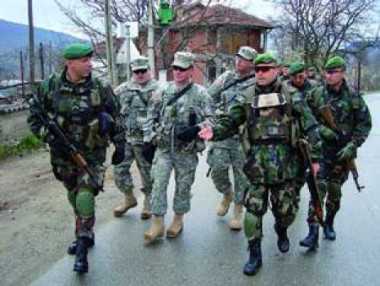
The Hungarian Defence Forces have posted 12 personnel to the KFOR HQ in Pristina. From March 2011, a Hungarian officer will be posted as personnel /logistic chief for six months with an assistant, and currently there are 11 Hungarian troops in the Joint Logistic Support Group set up at the HQ where the Senior National Representative is Lt-Col. Imre Mata. 12 HDF personnel are posted to the HQ of the Multinational Battle Group-West (MNBG-W) stationed in Pec/Peje where the Hungarian chief of staff and his assistant commenced their tours of duty in May 2010. Here the Senior National Representative is Lt-Col. Lajos Peszt.
Hungary’s “main force" in Kosovo – the first troop rotation of the HDF KFOR Contingent (HUN CON) – deployed to the area of operations on September 1, 2009. The HUN CON is based in Camp Villaggio Italia in Pec/Peje and serves under Lt-Col. László Kanyó. The maneuver element of the 211-strong HUN CON is assigned to the Slovenia-led multinational maneuver battalion of the MNBG-W (1 Company, CIMIC cell, HUMINT cell and staff elements).
The Hungarian contingent’s extremely complex duties include maintaining a safe and secure environment (SASE), ensuring freedom of movement in the area of responsibility (AOR) and protecting repatriated Serb enclaves by 24-hour presence patrolling. Hungarian troops guard major religious sites and participate in searching for wanted persons based on KFOR arrest warrants. Their further tasks include border closure, patrolling the borders (GATEs) and conducting search and rescue (SAR) operations. They are on call day and night, being ready to conduct airmobile operations. Furthermore, they are responsible for crowd and riot control (CRC) as well as convoy and VIP escort over the entire area of Kosovo. They are ready to protect properties with designated special status (PrDSS) in any Serbian enclave, to conduct dismounted patrols (DP), to mount patrols with combat vehicles and to operate checkpoints and observation posts (OP) night and day. They are tasked with providing a company-strong tactical reserve force (TACRES) for the MNBG-W and a battalion-strong TACRES for the KFOR HQ at four hours’ notice, and to reinforce the guards at the camp if necessary.
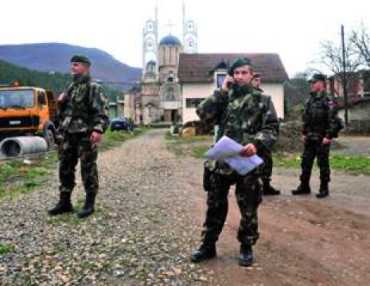
The current HUN CON rotation is going to be relieved by a contingent drawn from the 5/1 Infantry Battalion of the HDF 5th “Bocskai István" Infantry Brigade. The brigade commenced training for the KFOR mission in September 2010 to take over responsibility in February 2011. In line with the KFOR Concept of Operations (CONOPS) and the corresponding Hungarian troop contribution, the task scheme of the new contingent will be significantly different. From March 1, 2011, the maneuver infantry company will deploy as an element of a Portugal-led maneuver battalion directly subordinate to the Commander of KFOR (COM KFOR). Lt-Col. Sándor Szabó, Commanding Officer, Operations Support Battalion, HDF 5th “Bocskai István" Infantry Brigade has been appointed the new HUN CON commander. The changes to the task scheme do not affect the troop level of the HUN CON, which will remain the same.
In addition to several staff officers posted to different commands and the HDF KFOR battalion, until 2010 the Hungarian Defence Forces provided a special capability in Kosovo. At the request of NATO, the Preventive Medical Laboratory of the HDF (HDF PML) deployed to the KFOR HQ in Pristina, Kosovo on January 26, 2001. Owing to some changes in the KFOR force structure and the withdrawal of the HDF Guard and Security Battalion, the HDF PML was also restructured. Between July 1, 2008 and the spring of 2010, a staff of ten continued their work as a new military organization, the HDF KFOR Preventive Medical Laboratory. Presently two HDF personnel are working as laboratory assistants on the staff of the Germany-led Camp Prizren Field Hospital.
Finally, there is another position related to Kosovo, although it is not in the same region – one Hungarian officer is posted to the NATO Military Liaison Office (MLO) in Belgrade.
(Our article is based on the study Political and economic consequences of the declaration of independence in Kosovo by József Juhász and Sándor Miszlai.)
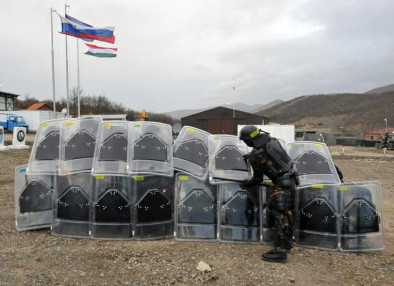
Photo: László Tóth and archive